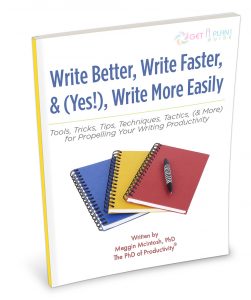Improving Your Writing Productivity – Editing and Revising by Meggin McIntosh, PhD
 Writing is not a one-step process. It not only has many steps but the steps, which are really phases, are recursive. You start to compose and then you decide you need to do some additional research. Then you compose some more and decide you need to start “fixing” some of your writing, and then…well. You know how this goes.
Writing is not a one-step process. It not only has many steps but the steps, which are really phases, are recursive. You start to compose and then you decide you need to do some additional research. Then you compose some more and decide you need to start “fixing” some of your writing, and then…well. You know how this goes.
In general, this is an inefficient and reasonably unproductive way to get your writing done. Let me share ten ways to help you be more productive in your writing process, particularly focusing on the editing and revising portions. Note: Although editing and revising are somewhat different aspects, we will consider them together for this week’s tips especially because they are separate from the ‘creating & composing’ part of writing.
-
Separate editing and composing. These two processes use different parts of our brains and when we try to write (compose) and then edit what we’ve written and then write some more and edit that, we end up producing very little and we feel frustrated with the overall process. Keep these two phases separated. You might even see me mention this again.
-
Read out loud. It is amazing how we can catch errors and other problems in our writing when we read it out loud. So during your editing/revising time, just read what you have written out loud.
-
Read backwards. When you are doing copy editing and in particular looking for typos or other misspellings, start at the end of your document and read backwards (not the letters but word by word). You can’t build any momentum this way because the syntax isn’t helping. You are able to just focus on copy editing (spelling, punctuation, etc.)
-
Don’t use words you can’t define. Since I have taught elementary school, high school, undergraduates, and graduate students (and also help professors with their writing), I know that we all have a temptation to sound smart. Let us agree that we are smart. Then, let’s be smart about using words that we know the meanings for. We run the risk of using a word incorrectly (not considering its connotation, for example) if we are not truly familiar with the word and what it means. So, keep expanding your vocabulary, but be careful about using words in your writing that you cannot easily define. During your editing and revising portions, ask yourself if you can define all the words you’ve used. If the answer is no, then remove them and find alternatives.
-
Separate editing and composing. I know I mentioned this one before but I have to mention it again. So many writers are not tapping into their brains efficiently. You need to have days (or times) that are just for composing. During the composing phase, you generate ideas and just go with the flow, not stopping or “fixing.” Then, you have other times where you are only editing and revising. Start getting in this habit today.
-
Read through your manuscript for specific reasons (e.g., eliminate passive voice, check all pronoun referents, verify spelling, ensure the flow of ideas). If you are trying to edit for everything all at once, it is not only not efficient, but you are quite likely to miss some glaring problems and issues. Just choose one key area and read and edit for that particular area.
-
Read through the eyes of your audience. Since you are writing for someone else (and we hope, lots of someone elses!), imagine one of them reading what you have written. What would they be noticing and thinking about based on what you have written? Use this tip when revising because it will give you ideas you wouldn’t have thought of…without your audience.
-
If you have to read a sentence a second time, fix it. My major advisor in graduate school taught me this and she was so right. Make it a guideline that any sentence you have to make a second pass over to make sure it makes sense is one that needs to be revised. And ask those who are helping you edit and revise to use that same guideline when giving you feedback.
-
Check for consistency, e.g., headings, subheadings. For those who write informational text (non-fiction), it is easy to forget this type of consistency. If you are writing academic text, then you REALLY have to pay attention to consistency and adherence to whatever style guide is being used (e.g., APA, MLA, and the like). If you know you are not a stickler for details, then get help with someone who knows and attends to the style that you need.
-
Separate editing and composing. They are two different aspects of writing and you slow yourself down if you are intermingling them. Have times for composing and separate times for editing or revising. And yes, this is the third time I mentioned this. It’s not that I can’t think of ten separate ideas. It is that this one is so critical and so overlooked that I felt the need to talk about it three times.
Why not be more productive with your writing? Just by attending to these ideas, you can increase your overall productivity. Put one of them in place today. I suggest you open up a document…right now!
You probably have some writing you need to edit. See if you can apply one of these ideas immediately. Once these suggestions have become habits, then you’ll really see your writing productivity soar.
© Meggin McIntosh, PhD (also known as “The PhD of Productivity”®). One of the ways that you can learn from Meggin about productive writing is through her 30 Articles in Just 30 Days program (www.30ArticlesinJust30Days.com).
 Whether you write for pleasure, to discover, to get paid, as a part of your work, as a way to instruct, or for any other purpose, streamlining your writing process is essential. The Get a Plan! Guide® to Writing Better, Faster, & (Yes!) More Easily: Tools, Tricks, Tips, Techniques, Tactics, & More for Propelling Your Writing Productivity.
Whether you write for pleasure, to discover, to get paid, as a part of your work, as a way to instruct, or for any other purpose, streamlining your writing process is essential. The Get a Plan! Guide® to Writing Better, Faster, & (Yes!) More Easily: Tools, Tricks, Tips, Techniques, Tactics, & More for Propelling Your Writing Productivity.
Inside this essential Get a Plan! Guide, you’ll find nearly 70 practical, easy-to-implement ideas that will propel your writing productivity.




